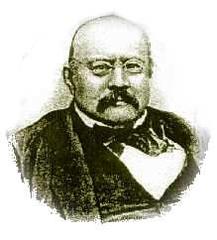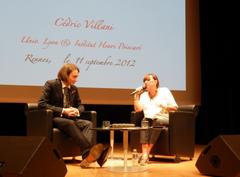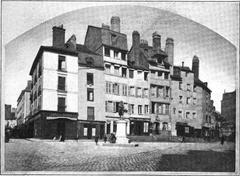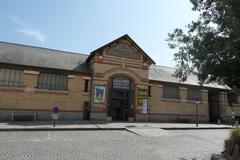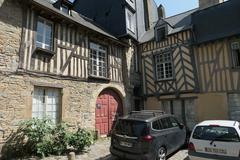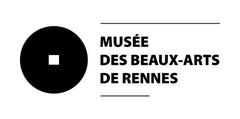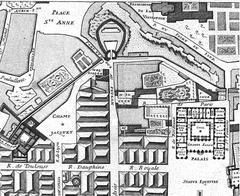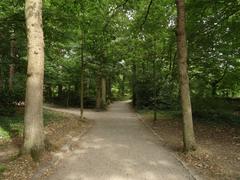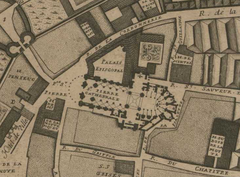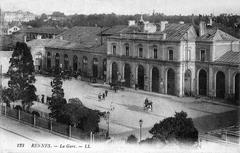Visiting Espace des Sciences in Rennes: Hours, Tickets, and Tips
Date: 31/07/2024
Introduction
Situated within the Champs Libres cultural complex in Rennes, France, the Espace des Sciences is a premier science center that has captivated visitors since its establishment in 1984. Designed to promote scientific literacy and foster a deeper understanding of science and technology, this center has grown into a vital educational and cultural institution (Espace des Sciences). The Espace des Sciences is part of the larger Champs Libres complex, which also includes the Museum of Brittany and the Rennes Library, creating a hub of knowledge and culture in the heart of the city. The center’s modern architectural design and state-of-the-art facilities, such as the Planétarium, offer immersive and interactive experiences that appeal to visitors of all ages (The Crazy Tourist). With a wide array of exhibits, educational programs, and community outreach initiatives, the Espace des Sciences is committed to making science accessible and engaging for everyone. Whether you are a local resident, a student, or a tourist, this guide provides comprehensive information to help you plan your visit, including insights into the history, attractions, ticketing details, and special events at this remarkable science center.
Table of Contents
- [Introduction](#introductionintroduction)
- [History and Significance](#history-and-significancehistory-and-significance)
- [Origins and Development](#origins-and-developmentorigins-and-development)
- [Architectural Significance](#architectural-significancearchitectural-significance)
- [Visitor Information](#visitor-informationvisitor-information)
- [Tickets and Opening Hours](#tickets-and-opening-hourstickets-and-opening-hours)
- [Accessibility and Inclusivity](#accessibility-and-inclusivityaccessibility-and-inclusivity)
- [Educational Programs](#educational-programseducational-programs)
- [Workshops and Lectures](#workshops-and-lecturesworkshops-and-lectures)
- [Community Engagement](#community-engagementcommunity-engagement)
- [Future Prospects](#future-prospectsfuture-prospects)
- [Exhibitions and Attractions](#exhibitions-and-attractionsexhibitions-and-attractions)
- [Les Champs Libres](#les-champs-libresles-champs-libres)
- [The Planetarium](#the-planetariumthe-planetarium)
- [The Laboratory of Merlin](#the-laboratory-of-merlinthe-laboratory-of-merlin)
- [Incroyable Cerveau](#incroyable-cerveauincroyable-cerveau)
- [L’Arbre](#larbrelarbre)
- [Virtual Tours](#virtual-toursvirtual-tours)
- [The Village des Sciences](#the-village-des-sciencesthe-village-des-sciences)
- [Special Events and Workshops](#special-events-and-workshopsspecial-events-and-workshops)
- [Visitor Amenities](#visitor-amenitiesvisitor-amenities)
- [Nearby Attractions](#nearby-attractionsnearby-attractions)
- [Frequently Asked Questions](#frequently-asked-questionsfrequently-asked-questions)
- [Conclusion](#conclusionconclusion)
- [References](#referencesreferences)
History and Significance
Origins and Development
The Espace des Sciences in Rennes, France, is a prominent science center that has evolved significantly since its inception. Established in 1984, the center was initially conceived to promote scientific literacy and foster a deeper understanding of science and technology among the general public. Over the years, it has grown to become a vital educational and cultural institution in the region.
The center is located within the Champs Libres, a cultural complex that also houses the Rennes Library and the Museum of Brittany. This strategic location has made it a central hub for learning and cultural exchange. The Espace des Sciences has continually expanded its facilities and programs to keep pace with advancements in science and technology, ensuring that it remains a relevant and engaging destination for visitors of all ages.
Architectural Significance
The architectural design of the Espace des Sciences is noteworthy for its modern and functional aesthetic. The building’s layout is designed to facilitate easy navigation and accessibility, with wide corridors and ample signage. The use of natural light and open spaces creates an inviting atmosphere that encourages exploration and discovery.
One of the architectural highlights is the Planétarium, a state-of-the-art facility that offers immersive astronomical experiences. The Planétarium’s dome is equipped with advanced projection technology, allowing for high-definition displays of celestial phenomena. This feature has made it a popular attraction for both amateur astronomers and casual visitors.
Visitor Information
Tickets and Opening Hours
The Espace des Sciences is open from Tuesday to Sunday, with visiting hours from 10 AM to 7 PM. The center is closed on Mondays and public holidays. Ticket prices vary depending on the exhibits and activities you wish to attend. General admission tickets are priced at €7 for adults and €5 for children aged 6-18. Children under 6 can enter for free. Discounts are available for students, seniors, and groups (Espace des Sciences Tickets).
Accessibility and Inclusivity
The Espace des Sciences is committed to making science accessible to everyone, regardless of their physical or cognitive abilities. The center has implemented numerous measures to ensure that its facilities and programs are inclusive. For instance, all exhibition halls and the Planétarium are wheelchair accessible, and canes and wheelchairs are available at the reception (Espace des Sciences Accessibility).
For visitors with visual impairments, the center offers tactile tours and scientific readings over the phone. These services are designed to provide an enriching experience for those who may not be able to fully engage with visual exhibits. Additionally, the Planétarium and auditorium are equipped with hearing loops, and some lectures are interpreted in French Sign Language (LSF), ensuring that visitors with hearing impairments can also participate fully (Espace des Sciences Accessibility).
Educational Programs
Workshops and Lectures
The Espace des Sciences plays a crucial role in science education in the region. It offers a wide range of educational programs and workshops designed to engage students and stimulate their interest in science. These programs are tailored to different age groups and educational levels, from primary school children to university students.
One of the center’s flagship educational initiatives is the “Laboratoire de Merlin,” an interactive lab where visitors can conduct hands-on experiments. This facility is particularly popular among school groups, as it provides a practical and engaging way to learn about scientific principles. The center also hosts regular lectures and seminars featuring prominent scientists and researchers, further enriching its educational offerings.
Community Engagement
The Espace des Sciences actively engages with the local community through various outreach programs. These initiatives aim to bring science to a broader audience, particularly those who may not have easy access to the center. For example, the “Espace des Sciences Chez Vous” program takes mobile exhibitions and workshops to schools, community centers, and other public spaces throughout the region (Espace des Sciences Chez Vous).
The center also organizes science festivals and public events that attract large crowds. These events often feature interactive exhibits, live demonstrations, and talks by scientists, providing a fun and educational experience for attendees. By bringing science into the community, the Espace des Sciences helps to foster a culture of curiosity and lifelong learning.
Future Prospects
Looking ahead, the Espace des Sciences is poised to continue its mission of promoting scientific literacy and fostering a love of learning. The center is constantly updating its exhibits and programs to reflect the latest scientific discoveries and technological advancements. Plans are also underway to expand its facilities and enhance its digital offerings, ensuring that it remains a cutting-edge institution in the years to come.
The Espace des Sciences is also exploring new ways to engage with its audience, including virtual reality experiences and online educational resources. These innovations will allow the center to reach a global audience and provide new opportunities for interactive learning. By staying at the forefront of science communication, the Espace des Sciences will continue to inspire and educate future generations.
Exhibitions and Attractions
Les Champs Libres
Les Champs Libres is a cultural center in Rennes that houses the Espace des Sciences, the Museum of Brittany, and the Rennes Library. Designed by architect Christian Portzamparc, this innovative space took 13 years to complete, from 1993 to 2006. The Espace des Sciences is a key component of Les Champs Libres, offering a variety of scientific exhibits and activities. The center includes a planetarium with a 14-meter-wide screen that seats 96 people, providing an immersive experience for visitors interested in astronomy (The Crazy Tourist).
The Planetarium
The Planetarium at the Espace des Sciences is one of its most popular attractions. It offers a range of shows that explore the universe, from the solar system to distant galaxies. The planetarium’s advanced projection system creates a realistic night sky, making it an educational and entertaining experience for visitors of all ages. Shows are available in multiple languages, and special sessions are organized for school groups and families (Espace des Sciences).
The Laboratory of Merlin
The Laboratory of Merlin is an interactive exhibit designed for families and children. It allows visitors to explore various scientific phenomena through hands-on experiments and activities. The exhibit covers topics such as physics, chemistry, and biology, making science accessible and fun for younger audiences. The Laboratory of Merlin is a great way to introduce children to the wonders of science in an engaging and educational environment (Espace des Sciences).
Incroyable Cerveau (Incredible Brain)
The “Incroyable Cerveau” exhibit delves into the mysteries of the human brain. It challenges common myths and misconceptions, such as the idea that we only use 10% of our brain. The exhibit explores the brain’s structure, functions, and the latest research in neuroscience. Interactive displays and multimedia presentations help visitors understand how the brain works and its role in shaping our thoughts, emotions, and behaviors (Espace des Sciences).
L’Arbre (The Tree)
“L’Arbre” is an exhibit that focuses on the life cycle of trees and their importance to the environment. It covers topics such as tree biology, growth, and the role of trees in ecosystems. The exhibit also highlights the various ways humans use trees, from construction materials to sources of food and medicine. Visitors can learn about different tree species and their unique characteristics through interactive displays and educational panels (Espace des Sciences).
Virtual Tours
For those who cannot visit in person, the Espace des Sciences offers virtual tours of its exhibits. These tours provide an online experience of the center’s attractions, allowing visitors to explore the exhibits from the comfort of their homes. The virtual tours include detailed descriptions, high-quality images, and interactive elements that replicate the experience of visiting the Espace des Sciences in person (Espace des Sciences).
The Village des Sciences
The Village des Sciences is an annual event organized by the Espace des Sciences as part of the Fête de la Science. Held from October 4 to 6, 2024, at Les Champs Libres, the event focuses on water in all its forms. It features a variety of activities, including workshops, exhibitions, and presentations by researchers. The Village des Sciences aims to make science accessible to everyone, with events designed for both experts and curious visitors of all ages (Espace des Sciences).
Special Events and Workshops
The Espace des Sciences regularly organizes special events, workshops, and conferences to enhance the visitor experience:
-
Fête de la Science: This annual event, coordinated by the Espace des Sciences, celebrates scientific curiosity and discovery. The 2024 edition promises a range of activities and exhibits designed to engage visitors of all ages (Espace des Sciences).
-
Conferences and Discussions: The museum hosts conferences and discussions with scientists, providing visitors with the opportunity to engage with experts and learn about the latest scientific advancements (Espace des Sciences).
Visitor Amenities
The Espace des Sciences offers several amenities to ensure a comfortable and enjoyable visit:
- Parking: Visitors arriving by car can use the Charles de Gaulle parking facility located nearby (Espace des Sciences).
- Accessibility: The museum is designed to be accessible to visitors with disabilities, ensuring that everyone can enjoy the exhibits and activities.
- Gift Shop: A gift shop offers a range of science-themed souvenirs, books, and educational materials for visitors to take home.
Nearby Attractions
The Espace des Sciences is situated within the Champs Libres cultural center, which also houses the Musée de Bretagne and the Library of Rennes Métropole. Visitors can explore Breton history and culture at the Musée de Bretagne, which features extensive displays from ancient times to the modern era (Lonely Planet).
Other nearby attractions include:
- Musée des Beaux-Arts: Located 0.32 miles from the Espace des Sciences, this museum boasts collections spanning the 15th century to the present, including a section devoted to antiquities (Lonely Planet).
- Piscine Saint-Georges: Approximately 0.49 miles away, this historic swimming pool is housed in a stunning building constructed between 1923 and 1926 (Lonely Planet).
- Palais du Parlement de Bretagne: This 17th-century building, located 0.54 miles from the museum, was the former seat of the Breton parliament and now serves as the Palais de Justice (Lonely Planet).
- Cathédrale St-Pierre: Situated 0.59 miles from the Espace des Sciences, this cathedral is a significant historical and architectural landmark in Rennes (Lonely Planet).
Frequently Asked Questions
Q: What are the Espace des Sciences opening hours?
The Espace des Sciences is open from Tuesday to Sunday, from 10 AM to 7 PM. It is closed on Mondays and public holidays.
Q: How much are tickets for Espace des Sciences?
General admission tickets are priced at €7 for adults and €5 for children aged 6-18. Children under 6 can enter for free. Discounts are available for students, seniors, and groups.
Q: Is Espace des Sciences accessible for people with disabilities?
Yes, the Espace des Sciences is wheelchair accessible and offers various services for visitors with visual and hearing impairments.
Conclusion
The Espace des Sciences in Rennes stands as a beacon of scientific enlightenment and cultural enrichment. From its inception in 1984, it has continually evolved to reflect the latest advancements in science and technology, ensuring that it remains a dynamic and engaging destination for all visitors (Espace des Sciences). With its strategic location within the Champs Libres complex, the center offers an array of interactive exhibits and educational programs that cater to diverse audiences. The Planétarium, the Laboratory of Merlin, and the various exhibits on neuroscience and environmental science provide rich, hands-on learning experiences (The Crazy Tourist). The center’s commitment to accessibility and inclusivity ensures that everyone, regardless of their physical or cognitive abilities, can enjoy and benefit from the exhibits (Espace des Sciences Accessibility). Looking to the future, the Espace des Sciences aims to expand its digital offerings and remain at the forefront of science communication. Whether through virtual reality experiences or community outreach programs, it continues to inspire curiosity and a love for learning. For anyone interested in the wonders of science, the Espace des Sciences is an essential visit, promising an enriching experience that combines education with entertainment.
References
- Espace des Sciences. (n.d.). Practical Information. Retrieved from https://www.espace-sciences.org/rennes/infos-pratiques
- The Crazy Tourist. (n.d.). 15 Best Things to Do in Rennes (France). Retrieved from https://www.thecrazytourist.com/15-best-things-rennes-france/
- Espace des Sciences Accessibility. (n.d.). Practical Information. Retrieved from https://www.espace-sciences.org/rennes/infos-pratiques
